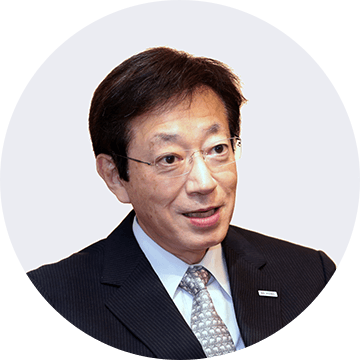Message Interview with the Chair

Chair Kizo Hisamoto
(Mayor of Kobe City)
- Q
Mr Hisamoto, you are the Mayor of Kobe City and therefore chair of the Japanese Mayors’ Association of Designated Cities, an association of 20 cities in Japan. What specific goals and thematic priorities have these cities set themselves to achieve the 2030 Agenda?
- A
The Japan Designated Cities Mayors Association (JDCMA) is a federation of 20 large cities in Japan. We actively exchange opinions on pressing issues faced by large cities and the future of these cities. In addition, we express opinions and make requests for solutions to these issues.
Regarding the Sustainable Development Goals (SDGs), an Energy and Environment (SDGs) Subcommittee has been created under the JDCMA, and discussions are underway with the main theme of “Creating a sustainable decarbonized society.”
In Japan, awareness of and interest in the SDGs is high, and many local governments have incorporated SDG concepts and principles into their policies and plans. Each designated city is working to lead Japanese local governments in addressing issues that threaten sustainable development, such as the realization of a zero-carbon society and addressing biodiversity loss.
- Q
How do you evaluate the cooperation between G7 and Urban7 (U7) so far?
- A
In 2022, with the support of the German government, we believe we were able to present a declaration that reflects the voices of the local governments of the G7 countries more systematically and effectively.
The JDCMA has been participating in the activities of the U7 as a coalition of Japanese cities since 2021. I participated in the U7 Mayors Conference held in May 2022 as the Chair of the JDCMA and reiterated that major cities, as leaders of cities, must proactively work toward the realization of a sustainable society, including taking measures to combat climate change, protect biodiversity, and eliminate intergenerational inequalities, while cooperating and collaborating with the national government.
Thanks to the efforts and leadership of the German local governments involved in the U7, the Declaration has been delivered to the German government, and the importance of cities is not only mentioned in the G7 Leaders' Communiqué but also emphasized in several ministerial communiqués and documents, which suggests that the U7 activities, including the “Urban7 Mayors Declaration 2022,” are being appreciated and that our collaboration between G7 and U7 is progressing.
- Q
In 2023, Japan will take over the presidency of the G7. This means that Japan will also represent the U7. Do you already have plans for the further development of the relationship?
- A
The U7 began its activities in 2021, but in terms of local government contribution to the G7 discussions, it began 7 years ago in 2016 when local governments voiced their opinions in conjunction with the G7 Environment Ministerial Meeting held in Toyama, Japan.
We, the JDCMA, as representatives of Japan's chairmanship of the 2023 G7 Summit, will take over the U7 Summit. Compared to seven years ago, we feel that internationally the roles of cities are recognized strongly and that in order to achieve a sustainable world, cities should be involved in policy making at all levels as equals with the national governments.
The tension over the Russian war in Ukraine has made energy security, in particular, a global issue, and there are many other challenges we face. I believe that the world will move in the right direction if we, as local governments, keep a close eye on the social situation of the moment and proactively tackle these issues while staying close to our citizens.
We would like to deepen our dialogue and cooperation with the government while utilizing our network of 20 major Japanese cities and also working with ICLEI.
- Q
What support do you expect from the national governments that cities can utilize to unleash their transformative power in the sense of the 2030 Agenda and get closer to the Sustainable Development Goals, especially with the current diverse global challenges we are facing?
- A
The social condition has changed over the past few years, including measures against COVID-19 and responses to the effects of the Russian war in Ukraine. In addition to responding to these changes in the social situation, climate change countermeasures and the transition to a decarbonized society are also in need of immediate attention. For this reason, the role required of local governments, including ensuring the safety and security of citizens' lives, is becoming extremely important.
In order to make the transition to a decarbonized society without leaving citizens behind, it is necessary to respond on a city-by-city basis and in detail, reflecting the actual conditions and capacity of each city.
In order to promote decarbonization measures, such as the development of hydrogen energy and low-carbon public transportation such as railroads, promptly and steadily, cooperation between cities and governments is indispensable. The government should establish a framework for international cooperation while promptly providing information to local governments on measures to be taken.
In addition, in allocating authority and budgets from the national government, local governments should be granted discretion so that the budget can be spent as freely as possible.
Although U7 did not receive official recognition as an Engagement Group in 2022, we are looking forward to working with all parties involved in order to receive such recognition in 2023.
- Q
You hosted the U7 Mayors Summit as the chair of the coalition of large cities in Japan, the host nation of this year’s G7 Summit. As the chair, you played a major role in developing the U7 Mayors Declaration. Following the Summit, what are your goals going forward?
- A
I believe that this year’s Mayors Summit reaffirmed that the roles and activities of designated cities have universal value, not only within Japan but throughout the global community.
We hope to share our joint declaration—which highlights the possibilities, roles, and importance of both our cities and the many like them—with relevant ministries and agencies throughout Japan. In addition to gaining an understanding of our mission, we hope to inform organizations at various levels in Japan of what we do.Although this is only the third U7 summit since activities began in 2021, this year’s summit really reinforced the importance of building a global network among cities and actually coming together to exchange views and discuss ideas, and to highlight our common values and ambitions.
Finally, all of us in the JDCMA would like to expand the scope of our activities even further by ensuring the roles and opinions of cities are reflected in the themes being discussed at G7 Summit meetings and related ministerial meetings.
